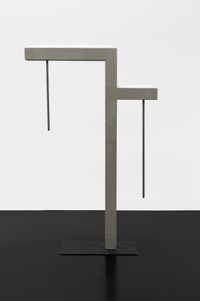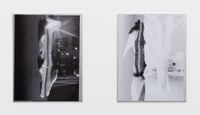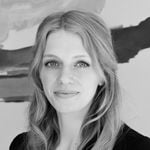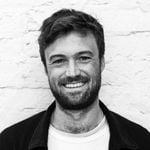Peter Fischli is one half of the Swiss collaboration known as Fischli/Weiss, whose work explores the banality of the everyday by placing common objects in absurd contexts.
Read MoreBorn in Zurich, Switzerland, Peter Fischli studied in Italy at the Academy of Fine Arts in Urbino from 1975 to 1976 and the Academy of Fine Arts in Bologna from 1976 to 1977. He met David Weiss in 1978. They formed Migros, a live rock band, before transitioning to art the following year. The duo had their first solo exhibition in 1981 at the Galerie Balkon in Geneva.
Fischli/Weiss are known for their sharp humor and pointed sense of observation that transgresses any single format or medium. Spanning across photography, film, installation, and sculpture, their 30-year-long collaboration is informed by a curiosity for the world and a distaste for the seriousness of contemporary art.
Influenced by the Dada and Fluxus movements and artists such as Marcel Duchamp and Dieter Roth, Fischli/Weiss' works often challenge the nature of the artwork and the artist by evoking their subjectivity. Commonplace objects are transformed and transposed in unexpected environments, often for no greater reason.
For Wurstserie (Sausage Series) (1979), their first collaborative work, a bathroom shelf was transformed into a runway for fashionable sausages, while an unmade bed became an Alpine landscape. The ten coloured photographs showing the meat protagonists in everyday scenes set the tone for future works.
In the early 1980s, Fischli/Weiss started making sculptures. Suddenly This Overview (1981—2012) is an aggregation of over 600 unfired clay sculptures that staged the lives of such famous people as Marco Polo and Freud's Anna O, combining high and low art to depict scenes from history, entertainment, and popular culture, cast in unremarkable materials.
Already-Mades
Polyurethane Objects (1982) borrowed the materials of Hollywood propmakers to create replicas of ordinary objects found around the artist's studio, including a paint roller, a bottle of bleach, a few M&Ms, and a cardboard box. 'Unlike Pop art, which turns one particular object into an icon, they are a collection of replicas of worthless everyday objects,' remarked Fischli in a 2006 interview.
For the 'Rubber Sculptures' series, Fischli/Weiss spun the narrative around casting utilitarian objects—such as Divider (1987), Vase (1986—1987), and Dog Dish (1987)—in heavyweight black rubber.
Fischli/Weiss's artworks challenge the distinction between object and artwork, transplanting their concerns across series and mediums. 'Quiet Afternoon' (1984—1985), a photograph series depicting kitchen utensils, vegetables, tires, chairs, and bottles, shows the objects stacked and balanced in the air, suspended in time.
Its successor, The Way Things Go (1987), a 16mm film that previewed at Documenta 8 the same year, recovers the same objects projected in the air. They are shown tossed across the warehouse where the shoot took place—crashing, burning, deflating, exploding—recovering the energy from the photographs and recalling the kinetic sculptures of Jean Tinguely.
Fischli/Weiss' later works are more conceptual. How to Work Better (1991), a ten-point manifesto hand painted on a building on Houston Street in New York, offers suggestions such as 'Be Calm' and 'Smile'. The document was replicated from a sign on a bulletin board in a ceramic factory in Thailand printed three decades prior.
Planet People Profit (2021) similarly uses text to offer a critique of contemporary work culture. With reference to Peter Fisk's book, How to Embrace Sustainability for Innovation and Business Growth (2010), Fischli compiled self-help books, academic texts, and how-to guides that dealt with income generation and optimisation by tying them to sentiments of guilt and moral worth.
Fischli/Weiss worked together from 1979 to 2012. Weiss passed away in Zurich in April 2012, marking the end of a 33-year collaboration. Fischli continues to work in Zurich. Their works are held in the collections of the Art Institute of Chicago, The Museum of Modern Art in New York, the Walker Art Center in Minneapolis, and the Hamburger Bahnhof in Berlin.
Fischli and Weiss represented Switzerland six times at the Venice Biennale. Their work has been featured in Documenta and Skulptur Projekte Munster. The duo won the Golden Lion award for Questions (1981—2002) in 2003. In 2016, the Solomon R. Guggenheim Museum in New York showed the first large-scale retrospective of their work.
On Ocula, Peter Fischli is represented by Galerie Buchholz and Sprüth Magers. Recent exhibitions hosted by Sprüth Magers include Peter Fischli (2021).
Elaine YJ Zheng | Ocula | 2021






